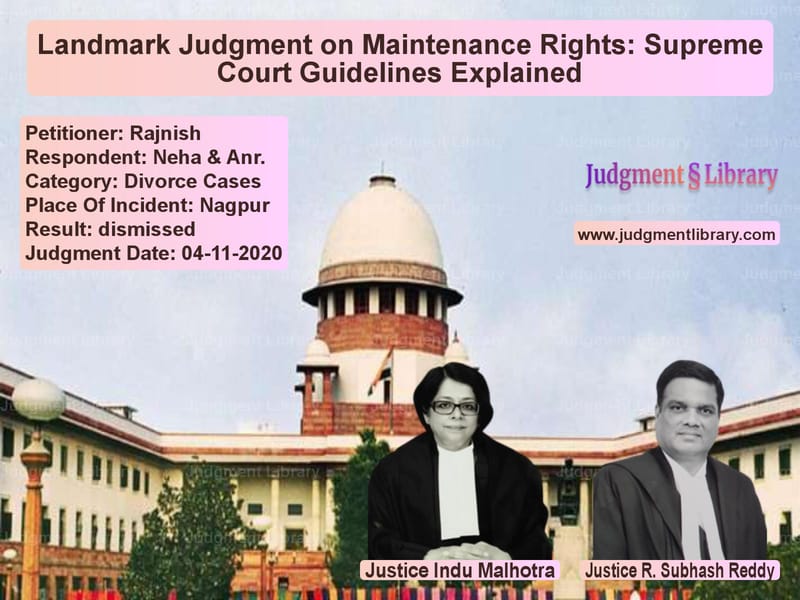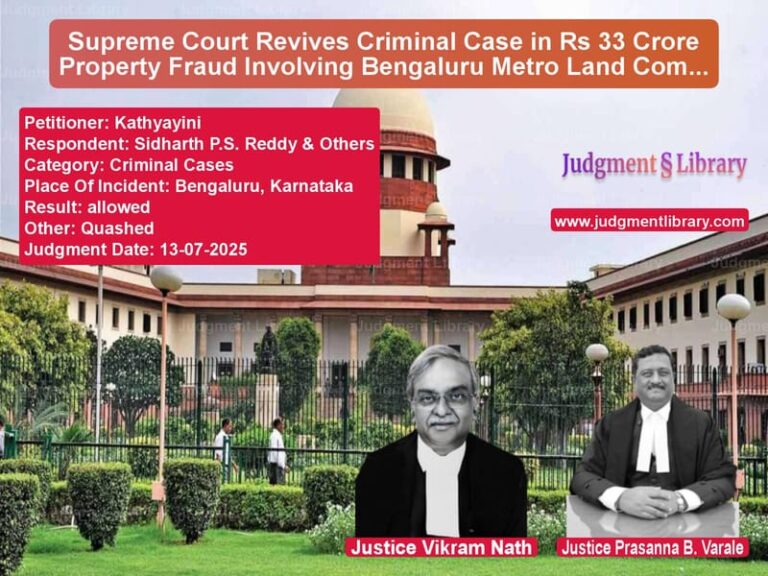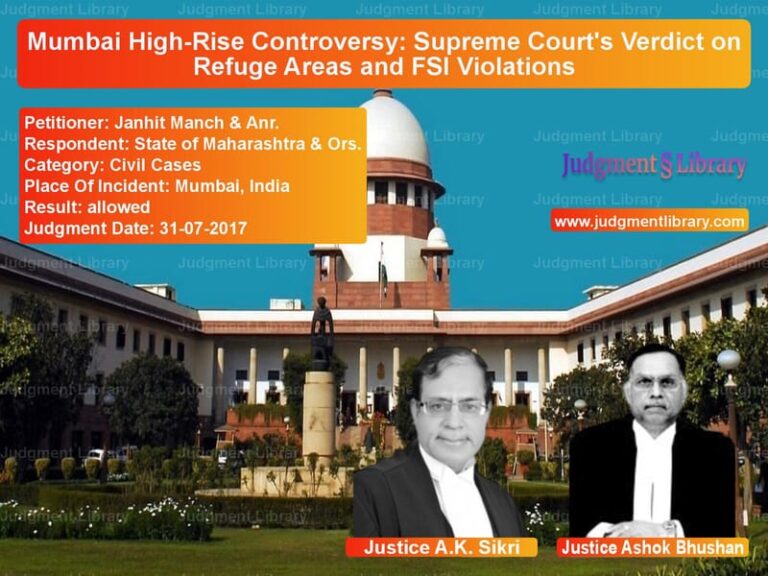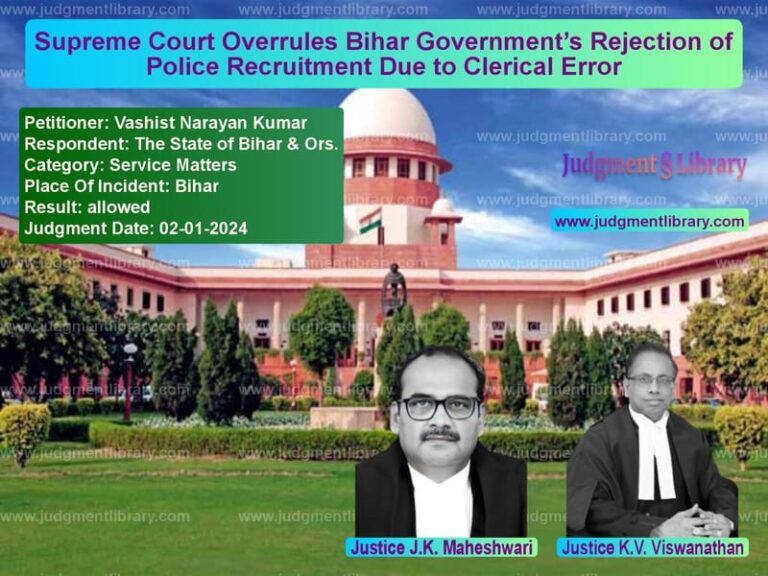Landmark Judgment on Maintenance Rights: Supreme Court Guidelines Explained
The Supreme Court of India has delivered a landmark judgment in Rajnish vs. Neha & Anr., addressing crucial aspects of maintenance rights under various family laws. The judgment, delivered on November 4, 2020, establishes comprehensive guidelines to ensure consistency and uniformity in maintenance-related cases across courts. The case involved a petition for interim maintenance under Section 125 of the Cr.P.C., filed by the respondent-wife on behalf of herself and her minor son.
The judgment aims to address issues such as overlapping jurisdictions, delays in awarding maintenance, enforcement of maintenance orders, and criteria for determining the quantum of maintenance. By setting clear directions, the Supreme Court has sought to eliminate ambiguities and provide a fair mechanism for granting maintenance to dependent spouses and children.
Background of the Case
The respondent-wife had filed an application under Section 125 of the Cr.P.C. for maintenance, stating that she had been compelled to leave the matrimonial home due to strained relations. The Family Court, after considering the facts, awarded interim maintenance of Rs. 15,000 per month to the wife and Rs. 10,000 per month to the minor son.
The appellant-husband challenged the Family Court’s order before the Bombay High Court, arguing that he was unable to pay the awarded maintenance due to his financial constraints. The High Court upheld the Family Court’s decision, prompting the husband to appeal before the Supreme Court.
Petitioner’s Arguments
The appellant-husband raised the following key arguments before the Supreme Court:
- He was unemployed and had no steady source of income, making it impossible for him to comply with the maintenance order.
- The Family Court had erroneously relied upon his income tax returns from 2006 while determining maintenance in 2013.
- He had to borrow money from his father to pay the maintenance ordered by the lower court.
- He was exploring new business ventures to improve his financial condition and could not afford additional financial liabilities.
Respondent’s Arguments
The respondent-wife countered these arguments with the following points:
- The maintenance granted for their minor son was inadequate, considering the increasing costs of education and other living expenses.
- The husband had deliberately concealed his actual income and assets, including investments in real estate and business ventures.
- Despite court orders, the husband had not returned her Streedhan and had failed to comply with previous maintenance orders.
- There was no scope for reconciliation, given the husband’s non-compliance and lack of financial transparency.
Key Observations by the Supreme Court
The Supreme Court, after examining the facts of the case, upheld the Family Court’s order and issued comprehensive guidelines covering various aspects of maintenance. The Court noted that maintenance laws are enacted as a measure of social justice to provide financial recourse to dependent spouses and children.
1. Overlapping Jurisdiction
Maintenance claims can be filed under multiple laws, such as:
- Section 125 of the Cr.P.C.
- The Hindu Marriage Act, 1955
- The Domestic Violence Act, 2005
- The Hindu Adoptions and Maintenance Act, 1956
The Court directed that in cases where maintenance is awarded under one statute, courts must consider adjustments to avoid multiple maintenance orders leading to undue financial burden on the husband.
2. Payment of Interim Maintenance
To prevent unnecessary delays, the Court directed that interim maintenance applications must be disposed of within 60 days from the date of service of notice on the respondent. Both parties must submit affidavits disclosing their assets and liabilities to ensure transparency.
3. Criteria for Determining Maintenance
The Court provided a list of factors to be considered while determining maintenance:
- Status and standard of living of the parties.
- Income, assets, and liabilities of both spouses.
- Dependents, including minor children and elderly parents.
- Whether the wife is educated and capable of earning.
- The financial obligations of the husband.
- The inflation rate and cost of living.
4. Date from Which Maintenance Is Payable
To ensure fairness, the Court ruled that maintenance should be payable from the date of the application rather than the date of the order. This prevents the applicant from suffering financial hardship due to legal delays.
5. Enforcement of Maintenance Orders
One of the major challenges in maintenance cases is the enforcement of orders. The Court laid down strict measures to ensure compliance:
- Maintenance orders can be enforced like civil court decrees.
- If the respondent fails to pay, courts can attach property, impose fines, or order civil detention.
- Failure to comply with orders may result in contempt of court proceedings.
6. Striking Off the Defense
To prevent misuse of legal proceedings, the Court allowed courts to strike off the defense of a respondent who willfully disobeys maintenance orders. This ensures that cases are not unnecessarily prolonged due to the non-cooperation of the respondent.
Conclusion
This landmark judgment provides much-needed clarity and uniformity in maintenance laws. By setting clear guidelines on determining maintenance, enforcing orders, and preventing overlapping claims, the Supreme Court has taken a significant step toward protecting the rights of dependent spouses and children.
The ruling ensures that maintenance laws fulfill their intended purpose of providing financial security to those in need while preventing undue hardship for the paying spouse. With strict timelines and full financial disclosure requirements, the judgment aims to create a fair and just system for all parties involved.
Petitioner Name: Rajnish.Respondent Name: Neha & Anr..Judgment By: Justice Indu Malhotra, Justice R. Subhash Reddy.Place Of Incident: Nagpur.Judgment Date: 04-11-2020.
Don’t miss out on the full details! Download the complete judgment in PDF format below and gain valuable insights instantly!
Download Judgment: Rajnish vs Neha & Anr. Supreme Court of India Judgment Dated 04-11-2020.pdf
Direct Downlaod Judgment: Direct downlaod this Judgment
See all petitions in Alimony and Maintenance
See all petitions in Child Custody
See all petitions in Domestic Violence
See all petitions in Judgment by Indu Malhotra
See all petitions in Judgment by R. Subhash Reddy
See all petitions in dismissed
See all petitions in supreme court of India judgments November 2020
See all petitions in 2020 judgments
See all posts in Divorce Cases Category
See all allowed petitions in Divorce Cases Category
See all Dismissed petitions in Divorce Cases Category
See all partially allowed petitions in Divorce Cases Category







